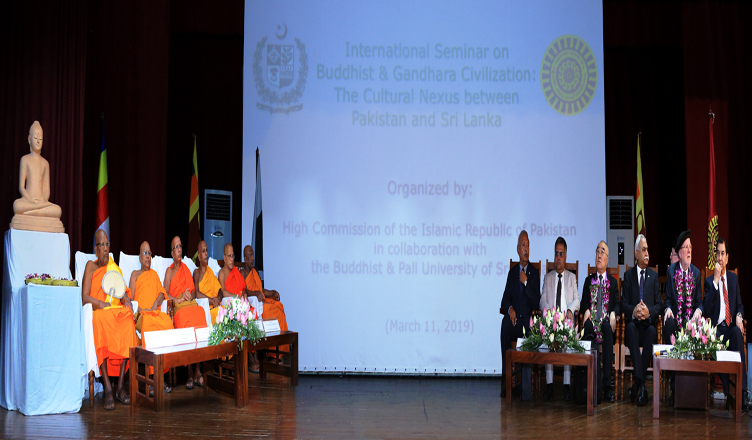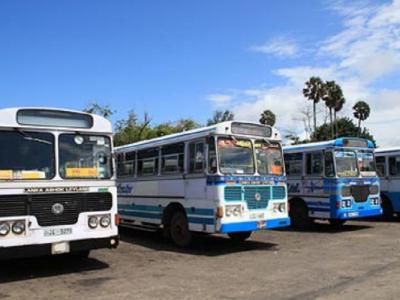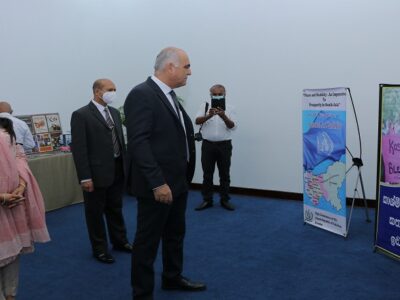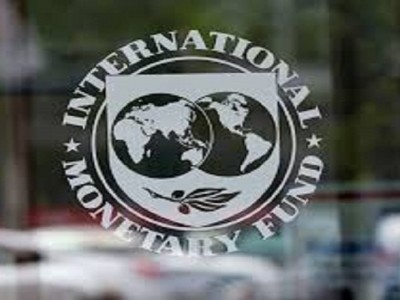(COLOMBO, LANKAPUVATH) –Sri Lanka and Pakistan inherit a rich cultural heritage and strong cultural relations which are deep-rooted in history. The mutual love between the two people, transcending any other consideration, is the foundation of special relationship that is further cemented by the commonality of eternal values of universal peace and love for humanity, espoused both by Buddhism and Islam.
The High Commissioner of Pakistan, Maj. Gen. (R) Dr. Shahid Ahmad Hashmat expressed these views during his concluding address at an International Seminar on ‘Buddhist & Gandhara Civilization: The Cultural Nexus between Pakistan and Sri Lanka’, organized by the High Commission of Pakistan in collaboration with the Buddhist & Pali University, Homagama held on March 11, 2019.
Renowned scholars from China, Germany, Pakistan and Sri Lanka were the keynote speakers at the Seminar. The scholars include Prof. Dr. Li Xiguang, Director, Tsinghua University International Center for Communication, China, Prof. Dr. Hugh van Skyhawk, University of Mainze, Germany, Brig. (R) Agha Ahmad Gul, Former Vice Chancellor, University of Balochistan, Pakistan, Dr. Safdar Ali Shah, Director General, High Education Commission, Pakistan, Prof. Dr. Ghani-ur-Rehman, Director, Taxila Institute of Asian Civilizations, Pakistan and Ven. Senior Prof. Dr. Gallelle Sumanasiri Thero, Vice Chancellor, Buddhist & Pali University of Sri Lanka.
Brig. (R) Agha Ahmad Gul, in his presentation, elaborated the various facets of Gandhara Civilization and its historical and cultural influence.
Prof. Dr. Ghan-ur-Rehman elaborated that one of the brightest chapter of the history of Pakistan is the Buddhist Gandhara that flourished during the first five centuries of the Common era.
Prof. Dr. Hugh van Skyhawk explained that among the many statues and relics of Gandhāra art, there is a motif that is better known than any other the world over: the fasting Siddhārtha.
Prof. Dr. Li Xiguang shared the travel notes about Uddiyana (Swat vally in northern Pakistan) written by the five Chinese pilgrims from Faxian in the 5th century, Song Yun in the 6th century, Xuanzang in the 7th century, Huichao and Wukong in the 8th century. In Chinese Buddhism, Uddiyanais identified with Western Heaven where the universal emperor Jade Emperor and the immortals live.
Dr. Safdar Ali Shah explained glimpses of Buddhist heritage, including famous monasteries, stupas, and specimen of Gandhara Art preserved in Pakistan. He further added that when Buddhism spread beyond its birthplace, the first two places where it took root were Gandhara (Pakistan) and Ceylon (Sri Lanka). Among other places, relics of Buddha were enshrined in the great stupas of Gandhara which linked it with other dhato-garbha (relic-depository) stupas around the world, including Sri Lanka.
Vice Chancellor, Buddhist & Pali University of Sri Lanka, Ven. Senior Prof. Dr. Gallelle Sumanasiri Thero warmly welcomed the guests and paid rich tribute to the Government of Pakistan for preservation of the archaeological treasures, Buddhist sites and artifacts, which he witnessed during his visit to Pakistan. He also appreciated the High Commission of Pakistan for holding the International Seminar at Buddhist & Pali University.
At the conclusion, High Commissioner of Pakistan, Dr. Shahid Ahmad Hashmat announced that the Government of Pakistan through its High Commission will be awarding 1000 scholarships to the Sri Lankan students in diverse fields and exchange of faculty members, students and programmes. He also invited the participants and students of the Buddhist & Pali University to visit Pakistan and assured that the High Commission of Pakistan will provide complete assistance and visa facilitation in this regard.
He emphasized that Pakistan is peace loving country and it supports promotion of cooperation in all areas with South Asian nations and with Sri Lanka in particular.




